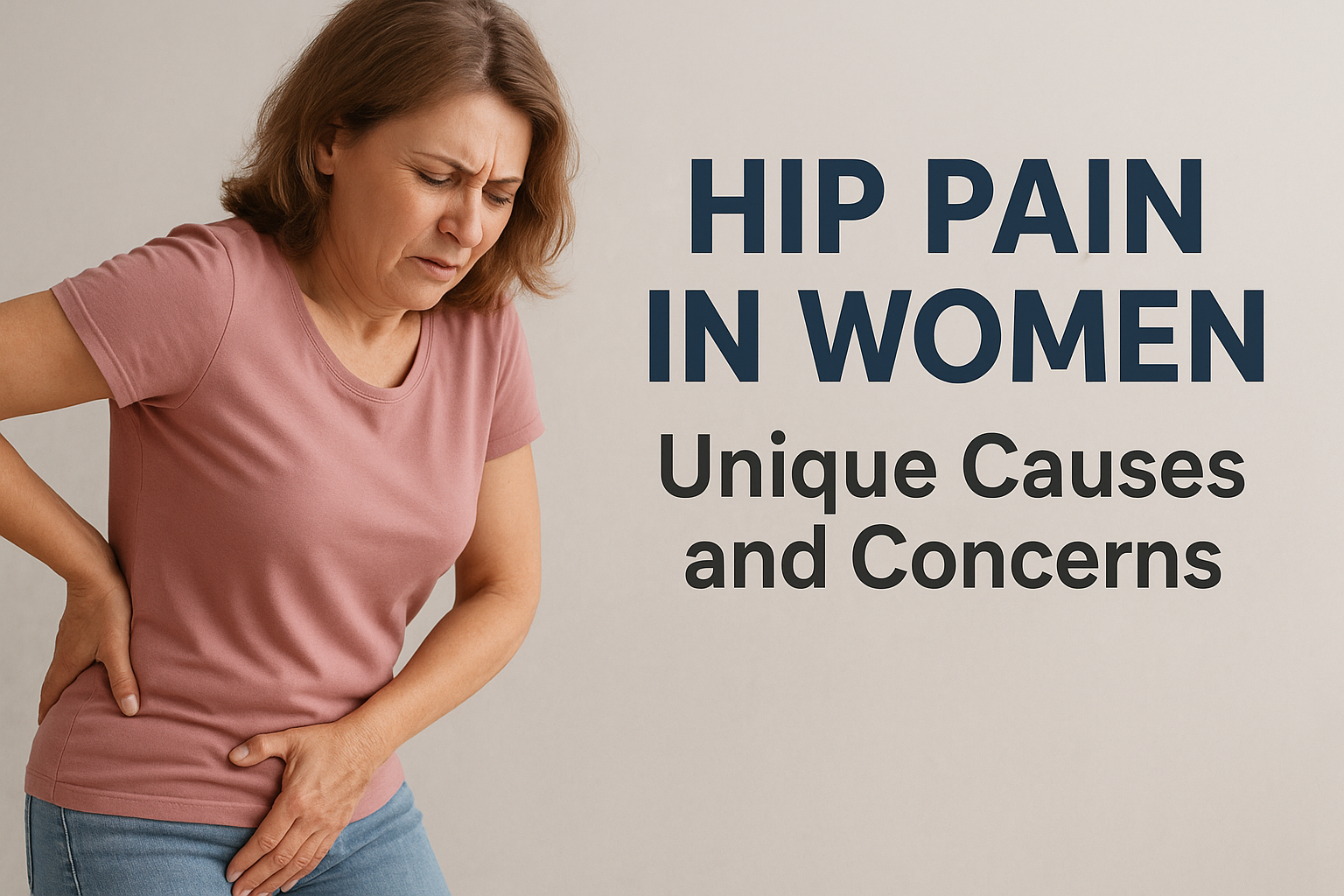Hip pain is a common issue affecting people of all ages, but in women, it often arises from unique biological, hormonal, and lifestyle factors. While occasional discomfort may be dismissed as fatigue or strain, persistent hip pain in women should never be ignored, as it may signal underlying conditions requiring attention.
Why Hip Pain is Different in Women?
Hip pain is a common complaint among both men and women, but research shows that women tend to experience hip problems more frequently and differently. This difference isn’t just due to lifestyle—it’s rooted in anatomy, hormones, and life stages that uniquely impact women’s musculoskeletal health. Understanding why hip pain is different in women can help with earlier recognition, better treatment, and improved quality of life.
1. The Female Anatomy
Women naturally have wider hips than men to support pregnancy and childbirth. While this is beneficial for reproductive health, it changes the angle of the pelvis and increases stress on the hip joints. This altered alignment may lead to greater wear and tear, especially during activities like running, squatting, or carrying weight.
2. Hormonal Changes
Hormones, especially estrogen, play a big role in bone and joint health. During menstruation, pregnancy, and menopause, hormonal fluctuations can loosen ligaments, reduce bone density, and increase inflammation in the joints—making women more prone to hip pain. After menopause, declining estrogen significantly raises the risk of osteoporosis and hip fractures.
3. Pregnancy and Childbirth
During pregnancy, the hormone relaxin loosens ligaments to allow for childbirth. While necessary, this can create hip and pelvic instability, leading to pain. Postpartum women may also experience long-lasting hip discomfort due to muscle weakness, changes in posture, or residual ligament laxity.
4. Higher Risk of Bone and Joint Conditions
Women are more likely than men to develop conditions such as:
Osteoporosis – weak and brittle bones that may fracture easily.
Osteoarthritis – wear-and-tear arthritis affecting the hip joint.
Labral tears – more common in women due to hip structure and flexibility.
5. Gynecological Factors
Sometimes, hip pain in women is not directly musculoskeletal. Conditions like endometriosis, ovarian cysts, or fibroids can cause pain that radiates to the hip and lower back. This overlap often delays correct diagnosis.
6. Lifestyle and Postural Differences
High-heel use, certain sitting postures, and balancing professional and household responsibilities may add extra strain to women’s hips. Over time, these factors can contribute to chronic pain.
Common Causes of Hip Pain in Women
1. Hormonal Influences
Estrogen plays a vital role in bone and joint health. During menopause, declining estrogen levels can lead to osteoporosis, making bones weaker and more prone to fractures. Hormonal changes can also affect joint flexibility, increasing hip discomfort.
2. Pregnancy and Postpartum Changes
During pregnancy, the hormone relaxin loosens ligaments to prepare the body for childbirth. While necessary, this can cause instability in the hips and pelvis, leading to pain. Postpartum, women may continue to experience hip and lower back pain due to weakened muscles and ligament strain.
3. Osteoarthritis and Osteoporosis
Women, especially after menopause, face a higher risk of osteoporosis (weak bones) and osteoarthritis (joint wear and tear). Both conditions commonly affect the hip joint, causing chronic pain, stiffness, and reduced mobility.
4. Gynecological Factors
Certain gynecological conditions such as endometriosis, ovarian cysts, or fibroids may cause referred pain in the hips and pelvic area. This is often mistaken for musculoskeletal pain, delaying proper diagnosis.
5. Hip Labral Tears
Women are more prone to labral tears due to hip structure differences and activities such as dancing, yoga, or athletics that demand flexibility. This condition leads to pain, clicking sensations, and difficulty moving the hip joint.
6. Postural and Lifestyle Factors
Wearing high heels, prolonged sitting, or carrying heavy bags can strain the hips over time. Women who juggle household and professional responsibilities may also develop chronic hip stress from repetitive movements.
When to Seek Medical Help
Women should consult a doctor if hip pain is:
Persistent or worsening at night
Accompanied by stiffness, swelling, or limping
Affecting daily activities such as walking or sitting
Associated with gynecological symptoms
Conclusion
Hip pain in women is influenced by a mix of biological, hormonal, and lifestyle factors that make it different from men’s experiences. Understanding these unique causes is the first step toward proper diagnosis and treatment.
At Dr. Abhisekh Orthocare, we focus on identifying these root causes with precision and providing advanced, personalized treatment to restore mobility and comfort.

